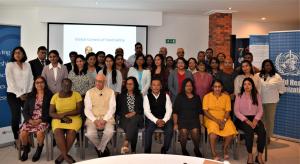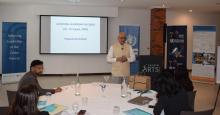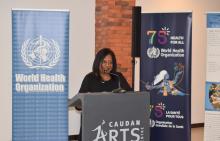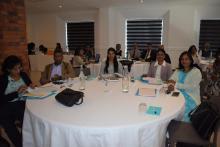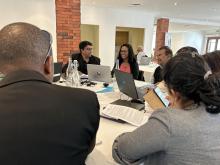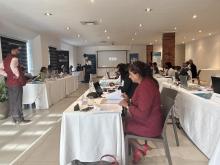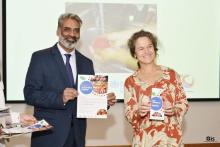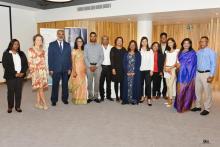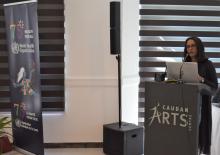Mauritius: Achieving leadership in the Codex Process through implementation of the Codex Trust Fund Project
Port Louis. With the aim to continuously improving food safety for greater health outcomes, Mauritius has made a leap of progress in achieving leadership in the Codex Alimentarius Commission through the implementation of the Codex Trust Fund (CTF) “Building Codex Mauritius” Project. Mauritius is the only African Country selected by the CODEX Trust Fund for support in 2019.
This 3-year project administered by World Health Organization (WHO) and Food and Agriculture Organisation (FAO) aims to build strong, solid and sustainable national capacity to engage in Codex Alimentarius Commission at global and regional levels.
This project was officially launched in June 2023 by the Minister of Agro-industry and Food Security in the presence of the WHO Representative in Mauritius, other Partners and national stakeholders. WHO supported the country to (i) adapt the Codex Procedural Manual and establish procedures for submission of comments, national positions, and participation/follow-up in Codex committees; (ii) enhance understanding and awareness of the importance of Codex among high-level policy and decision-makers, industry and scientific community, government officials and consumer activists and (iii) improve dissemination of information on the relevance of Codex and preparedness to generate data to contribute to the right level of information in development of global, regional and national food safety standards.
A high level meeting with key ministers and decision makers in July 2023 provided valuable insights to draft the National Codex documents which were validated before the capacity building sessions held in August 2023.
The new Codex procedural manual specifies the structure, mandate, activities, budget line, and all necessary procedures for the effective management and functioning of the Codex Contact Point, the National Codex Committees, and Technical Committees. In addition, a document on the process for monitoring outcomes of Codex meetings and planning for the subsequent steps was also elaborated as well as a policy brief for high officials to guide the legal recognition of the structure established for Codex activities in Mauritius.
Subsequent to the drafting of new procedural documents, a four-day in-depth training was held in August 2023 to empower national stakeholders and members of the National Codex Committee on the principles and concepts of food safety and particularly on the Codex Alimentarius standards. The training, facilitated by high level international experts working on Codex Alimentarius with the support of the Food Safety Standards Authority of India (FSSAI), also aimed at empowering national stakeholders to participate in Codex work at local, regional and global levels.
The detailed training programme includes a mock-drill exercise, creating the conditions of a typical Codex Committee for a practical understanding of the Codex session processes and the means to create consensus among countries on food safety standards. During this exercise, the participants were divided into three countries and participated in the mock Fourth Session of the Codex Committee on Food Safety in Mauritius. They learned how to review standards, proposed new ones and suggested amendments subjects of interest to the country like salted fish, spices and curry leaves. The Mock session gave the participants a practical understanding of the manner Codex Sessions are conducted. It enhanced the participants’ understanding of the conduct of the Codex Committee and helped to build the required drive and confidence to participate in a real Codex Session.
For a country like Mauritius which imports 75% of its food and food products and which has observed an increasing introduction of processed food as well as fast food in the past decades, international trade negotiations and food safety are important mean to influence healthy dietary habits and address the rising burden of non communicable diseases in the country.
Dr S. Neeliah, National Codex Contact Point in Mauritius, acknowledged the support received from the World Health Organization in implementation of the Codex Trust Fund Project. "We look forward for more collaboration with WHO to promote food safety in Mauritius", she added.
“As a member of the National Codex Committee, the Mauritius Chamber of Commerce and Industry has the privilege of participating in the electronic working group of Codex and getting first-hand information on new draft Codex standards, upcoming changes in the existing ones, and the emerging concerns by consumers,” said Mrs Yanessa Hurree- Quality, Safety, Environment and sustainability/National Codex Committee member
Mr Jayen Chellum , General Secretary of the Association des consommateurs de l'Île Maurice (ACIM) expressed satisfaction as participant to this training on Codex. “The Codex Alimentarius holds great significance for consumers worldwide as it serves as the crucial link between producers and consumers which enables us to gain knowledge about the products we consume, their contents, and ensures that consumers receive accurate information”. ACIM actively participates in the Codex committee together with local scientists, which allows stakeholders to have a say in the Codex Alimentarius, he said.
